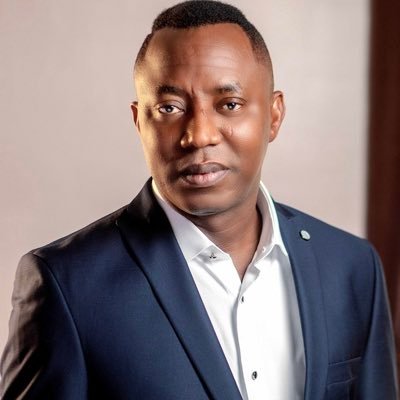Omoyele Sowore, the presidential candidate of the African Action Congress (AAC), has accused President Bola Ahmed Tinubu of ascending to power through manipulation rather than a legitimate electoral process. In a candid interview on VOP TV, Sowore declared that the 2023 general elections were marred by irregularities and failed to reflect the will of the Nigerian people.
“The Nigerian people did not elect Tinubu,” Sowore asserted. “He was selected by the Independent National Electoral Commission (INEC) through a process that everyone knows was riddled with vote allocation.”
The outspoken activist and former presidential candidate did not mince words as he addressed the legitimacy of Tinubu’s presidency. He linked the administration’s defensive posture to a lack of genuine popular support, noting that leaders who derive their power from the people have no reason to fear criticism.
“If you are legitimately the leader of the people and you are working for them, why will you be worried about criticism?” Sowore questioned. “This is the behavior of a leadership that knows its foundation is compromised.”
The Catalyst: Felix Morka’s Statement on Peter Obi
Sowore’s remarks came as a response to a statement made by Felix Morka, the publicity secretary of the ruling All Progressives Congress (APC). Morka had warned Peter Obi, the Labour Party’s 2023 presidential candidate, over his continued criticism of the Tinubu administration.
Obi had previously condemned the state of Nigeria under Tinubu, citing worsening political, economic, and security conditions as evidence of the government’s failure. In an interview, Morka countered, accusing Obi of “crossing the line” and suggested that Obi “has it coming to him, whatever he gets.”
Sowore dismissed Morka’s comments as indicative of a leadership culture that thrives on threats and suppression. “This has been the nature of defensive leadership in Nigeria,” he said. “Instead of solving problems, they hire people skilled in insults to silence critics.”
A Broader Critique of Nigeria’s Leadership
Sowore, a prominent advocate for justice and democracy, has long been a vocal critic of Nigeria’s political establishment. During the interview, he emphasized that the 2023 elections represented a continuation of the country’s history of compromised electoral processes.
“What we witnessed in 2023 wasn’t an election; it was an exercise in vote allocation,” he declared. “INEC played a pivotal role in selecting leaders, rather than allowing Nigerians to choose through free and fair elections.”
His comments echo widespread concerns raised by local and international observers who criticized the 2023 elections for lacking transparency. Reports of logistical failures, voter intimidation, and discrepancies in result transmission marred the credibility of the process.
Criticism of Tinubu’s Governance
Sowore also took aim at Tinubu’s governance style, accusing the administration of being more focused on silencing dissent than addressing Nigeria’s myriad challenges. He described the president as overly preoccupied with hiring individuals adept at issuing threats and insults rather than tackling critical issues such as insecurity, economic instability, and healthcare deficiencies.
“Why would a president prioritize hiring people to attack critics instead of solving the problems Nigerians face daily?” Sowore asked. He suggested that this approach reveals a government out of touch with its people.
The Larger Context: Nigeria’s Democratic Struggles
Sowore’s critique sheds light on long-standing concerns about the state of democracy in Nigeria. Since its return to civilian rule in 1999, the country has faced repeated allegations of electoral fraud and vote manipulation. Critics argue that these issues have eroded public confidence in democratic institutions, leaving many Nigerians disillusioned about the prospect of meaningful change.
The 2023 general elections, touted as a test of Nigeria’s democratic resilience, fell short of expectations for many. Despite promises of technological innovations such as the Bimodal Voter Accreditation System (BVAS) to ensure transparency, logistical challenges and delayed result transmission undermined the credibility of the process.
Calls for Accountability
Sowore’s statements have reignited calls for electoral reforms to ensure future elections genuinely reflect the will of the people. Activists and opposition figures continue to demand greater accountability from INEC and other stakeholders involved in the electoral process.
For Sowore, the path forward lies in empowering Nigerians to demand better governance. “It’s time for Nigerians to wake up and reclaim their democracy,” he urged during the interview. “We cannot allow a system of selection to continue masquerading as an electoral process.”
Public Reaction
Sowore’s remarks have sparked mixed reactions among Nigerians. Supporters of the AAC leader have praised his boldness in challenging the status quo, while critics have dismissed his comments as political posturing.
“I respect Sowore for always speaking truth to power,” said Chinedu Okonkwo, a university lecturer in Lagos. “He’s right about the need for electoral reform. Nigerians deserve leaders who are truly elected by the people.”
However, others see his criticism as unhelpful. “Sowore should focus on providing solutions rather than just attacking the government,” argued Bola Adebayo, a business owner in Abuja. “We need constructive engagement, not just blame games.”
Looking Ahead
As Nigeria grapples with the aftermath of the 2023 elections, the debate over electoral integrity and democratic governance is far from over. For many, Sowore’s comments serve as a reminder of the urgent need to address systemic flaws in the country’s political system.

